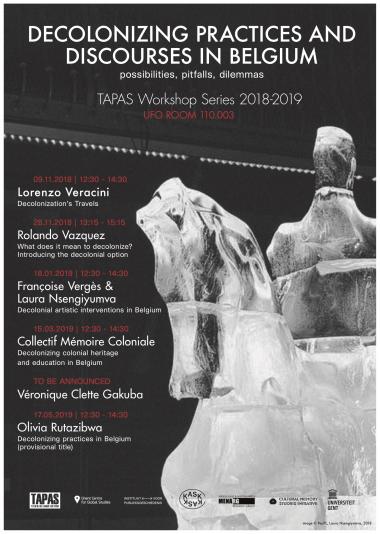Workshop series: Decolonizing Practices and Discourses in Belgium Possibilities, pitfalls, dilemmas
TAPAS WORKSHOP & READING GROUP SERIES 2018 - 2019
Around the world, the idea of ‘decolonization’ has become "the rallying cry of those trying to undo the racist legacies of the past" (Achille Mbembe, 2016). Following this international trend, various social movements in Belgium fighting for equal rights and against discrimination increasingly entangle their present-day demands for equality with demands to ‘decolonize’ our society. This doctoral school focuses on the complexities of the struggle for decolonization and discusses its dilemmas in the particular context of Belgium, on a practical and a conceptual level. It brings both researchers at universities and people from outside academia together in a reflective critical exercise on the question of what a ‘decolonization’ of ‘Belgium’ could mean and for whom.
The objective of this specialist course is to familiarize PhD students and other interested participants with the ongoing international debates about decolonization, with a particular focus on the Belgian case. We do this through a metahistorical lens and with an interdisciplinary approach. The central question revolves around what ‘decolonization’ means for whom in a Belgian context. Who are the actors asking for decolonization? What are their motivations? What is the role of ‘identity’ and ‘memory’ in these claims? How does the aim to recognize colonial past(s) and to ‘decolonize’ relate to other politics concerning the past in multicultural societies? How do decolonization claims relate to the ongoing debates surrounding historical justice, the politics of place, and the contestation of eurocentrism in historiography today? What are the promises and pitfalls of the decolonization- banner in the struggle against inequality and discrimination today? How does this reflect on the practices of doing research? We subsequently zoom in on different ‘spheres’ in the Belgian context around which decolonization debates are currently taking shape. Ultimately, we aim at combining reflections on the uses of the past, and the issue of ‘belonging’ in a multicultural setting, with discussions on specific ongoing societal challenges in each of these ‘spaces’.
Calls to ‘decolonize’ often explicitly address universities and the intellectual world. Scholars in various fields that are working on topics related to (post-)colonial history, indigenous history or slavery, are increasingly asked to ‘decolonize’ their perspectives. Despite its widespread usage, however, it is unclear what actions are envisaged in order to effect ‘decolonization’. As the term is associated with “a plethora of meanings, ambiguities, conflicting memories, and competing narratives” (Jan C. Jansen & Jürgen Osterhammel, 2017), it is the subject of both societal and scholarly disagreements and confusion. This course tries to establish an overview of where such claims are coming from, and of the various meanings these claims have in the Belgian context. Participants will be stimulated to reflect on what the implications of these discourses could be for their own research.
Researchers and students interested in joining our Doctoral School programme can now inscribe by sending an e-mail to tapas@ugent.be. As usual, TAPAS workshops and reading groups are informal and we welcome all interested colleagues and students to join the discussion.
More information@ http://www.tapas.ugent.be/activities/decolonizingpracticesanddiscoursesbelgium
